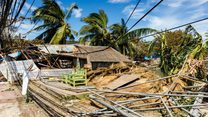The most common natural disasters threatening the Cayman Islands are hurricanes, although Cayman has been lucky in recent years to avoid the path of any major storm. Always be on high alert, as unpredictable weather conditions are more prevalent in hurricane season. In the event the Island does get hit by a severe storm, you will want to have taken practical steps beforehand to ensure you and your family stay safe and dry. For more information on preparing for a hurricane, visit Cayman Prepared and Cayman Resident.
Hurricane Checklist
Preparation is key. Prior to the start of hurricane season (June 1st to November 30th) put together a hurricane supply kit stocked with the items on the checklist below:
Supply Kit
- Several gallons of drinking water
- Long-life food that does not require refrigeration or to be cooked (tinned food is particularly helpful)
- Plywood and screw nails for windows/doors (if necessary)
- ‘C’ type fire extinguisher for electrical fires
- Oil and petrol for generator (optional)
- Portable gas cooker and refills
- Charcoal and lighter fluid
- Flashlight, lantern and oil
- Candles and matches/lighter in watertight bag
- Battery operated radio, fan and extra batteries
- First aid kit, sunscreen and feminine hygiene supplies
- Medication
- Mosquito coils, citronella candles and/or spray
- Life vests, goloshes and whistle
- Rope/strong twine, duct/packing tape
- Plastic sheeting to cover furniture
- Tarpaulin for roof
- Paper towel, toilet paper and napkins
- Disposable plates, glasses and cutlery
- Aluminium foil, plastic freezer bags
- Can opener/knife (e.g. Swiss army)
- Chlorine bleach (sterilising water) and Dettol (disinfecting hands and feet)
- Hand sanitiser and baby wipes (for personal hygiene)
- Ice chest (to stock up with ice in the run-up to a major storm)
- Baby supplies: nappies, wipes, food
- Pet food and litter box
In the immediate days leading up to the storm, make sure you have ticked off the following:
Things to Do
- Design a family plan for which shelter and route is best suited to your needs
- Store important documents, records, irreplaceable and precious items in watertight containers and back up to an external drive
- Fill cars with gasoline/charge if electric and move them to higher ground
- Withdraw cash from bank - ATMs won’t work without power
- Bring in everything from outside, i.e. bird feeder, hose, barbecue, chairs, potted plants
- Secure boat and remove all equipment - battery, life jackets, etc.
- Make arrangements for the safety of your pets
- Move furniture and belongings away from windows and doors and elevate off floor level
- Put silicone or foam around outside doors and also fill enough sandbags to protect the outside of the doors at ground level
- Pick up rugs from the floor and remove drapes from windows
- Buy buckets and sheets of plastic to protect furniture and wood floors from ceiling leaks
- Clean tubs/baths and fill them with water
- Turn freezer and fridge to the coldest setting. If power goes out, food and ice will last longer
- Charge cell phones and have cell phone charger that plugs into car lighter or a cranking mechanism
- Wedge sliding doors to prevent them lifting from tracks and reinforce garage door
- Keep swimming pool full, to around 12 inches from the top
- Turn off propane tanks
- Secure TV antennae
- Ensure there is an adequate supply of emergency food
- Close cistern openings and disconnect downspouts
- Fill empty gallon bottles with water for bathing and flushing
- Have raincoats/ponchos handy
- Make sure you have the phone numbers of family and friends and that they have yours
Make sure you are insured! These companies can assist you ...
And if you need to find out more about power outages then please contact CUC ...






